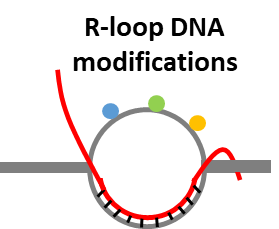Projects Offered
Roopesh Anand Petra Beli Petra Beli/Vassilis Roukos Dorothee Dormann René Ketting Katja Luck Carlotta Martelli Christof Niehrs_Ageing Christof Niehrs_Bioinfo Christof Niehrs_4R Sandra Schick Helle Ulrich Andreas Wachter Johannes Mayer_DCMem Johannes Mayer_DCSkin Wolfram Ruf Tim Sparwasser Uwe WolfrumCharacterization of R-loop associated DNA modifications
1 PhD project offered in the IPP summer call Molecular Mechanisms in Genome Stability & Gene Regulation
Scientific Background

R-loops are three-stranded nucleic acid structures comprising an RNA hybrid and a displaced single-stranded DNA (ssDNA). The exposed ssDNA makes R-loops a hotspot for DNA modifications that can impact R-loop dynamics, gene regulation and genomic stability. Recent studies have revealed that different nucleobases exhibit specific modifications in the context of R-loops, such as cytosine deamination to uracil cytosine oxidation to 5-formylcytosine, or guanosine oxidation to 8-oxoguanine. These modifications are thought to regulate R-loop stability and hence potentially affect genome stability and gene expression. These R-loop-enriched modifications highlight the importance of understanding their regulatory roles and potential as therapeutic targets in diseases linked to genomic instability.
PhD Project: Characterization of R-loop associated DNA modifications
The questions underlying this project are:
- How do specific DNA modifications within R-loops affect their structural stability and dynamics?
- What is the relationship between R-loop-associated DNA modifications and gene regulation?
- How do these modifications contribute to genomic instability and potentially to disease pathogenesis?
Approach: You will employ quantitative DNA-RNA immunoprecipitation sequencing to map the locations and frequencies of specific DNA modifications within R-loops across various genomic contexts. You may test the impact of these modifications on R-loop stability using CRISPR-Cas9 to engineer cell lines with and without specific modifications. You will then observe changes in gene expression, R-loop formation/disruption, and cellular phenotypes. You will conduct assays to measure rates of DNA damage, repair efficacy, and cell viability under conditions promoting R-loop formation and modification. This will help correlate specific modifications with increased genomic instability.
This project will be part of the RTG on R-loop Regulation in Robustness and Resilience (4R).
If you are interested in this project, please select Niehrs (Rloop) as your group preference in the IPP application platform.
Publication relevant to this project
Niehrs C and Luke B. (2020). Regulatory R-loops as facilitators of gene expression and genome stability. Nat Rev Mol Cell Biol. 21, 167–178. Link